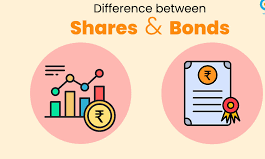Back to: Store Management SS 2
Welcome to today’s class!!
We are thrilled to have you in our class!!
In today’s Store Management class, we will be learning about Difference Between Bonds And Shares
Difference Between Bonds And Shares

Oftentimes you will hear people talking about stocks and stockholders, this is their own way of referring to share and shareholders. Whether it is stocks or shares, they are all traded in the stock market.
The primary function of the stock market is to bring buyers and sellers together into a fair, regulated, and controlled environment where they can execute their trades. This gives those involved the confidence that trading is done with transparency, and that pricing is fair and honest. This regulation not only helps investors but also the corporations whose securities are being traded. The economy thrives when the stock market maintains its robustness and overall health.
Let’s consider some differences between bonds and stocks
Stock market is a place where investors go to trade equity securities (for example, shares) issued by corporations. The bond market is where investors go to buy and sell debt securities issued by corporations or governments.
Stocks typically trade on various exchanges, while bonds are mainly sold over the counter rather than in a centralized location. The bond market does not have a centralized location to trade, meaning bonds mainly sell over the counter (OTC). As such, individual investors do not typically participate in the bond market.
Those who do, include large institutional investors like pension funds foundations, and endowments, as well as investment banks, hedge funds, and asset management firms. Individual investors who wish to invest in bonds may do so through a bond fund managed by an asset manager.
The other key difference between the stock and bond market is the risk involved in investing in each. When it comes to stocks, investors may be exposed to risks such as country or geopolitical risk (based on where a company does business or is based), currency risk, liquidity risk, or even interest rate risks, which can affect a company’s debt, the cash it has on hand, and its bottom line.
Bonds, on the other hand, are more susceptible to risks such as inflation and interest rates. When interest rates rise, bond prices tend to fall. If interest rates are high and you need to sell your bond before it matures, you may end up getting less than the purchase price. If you buy a bond from a company that isn’t financially sound, you’re opening yourself up to credit risk. In a case like this, the bond issuer isn’t able to make the interest payments, leaving itself open to default.
In summary, Stocks are investments directly in companies. When you buy a company’s stock, you buy a share of the company. You literally own a piece of the business. That means that as the publicly traded value of the business increases, your share of that value goes up. Conversely, if the value declines, the value of your stock will go down. If the business makes a big profit and decides to give some of that money to its owners, you’ll receive a dividend. Bond on the other hand, Bonds are investments in debt. Bonds are a way for companies and governments to raise money: They’re essentially small loans you make to large entities.
Evaluation
Explain the following:
- Bonds
- Shares
Reading Assignment
Give three functions of Money Market
Weekend Assignment
Highlight five differences between Bonds And Shares.
We hope you enjoyed today’s class. In our next class, we will be talking about Similarities Between Money And Capital Market.
Let us know your thoughts and questions in the comment section, and we will attend to them as fast as we can.
